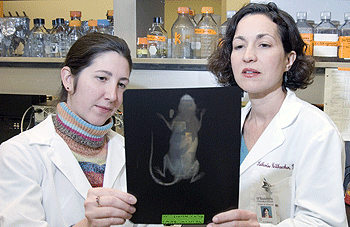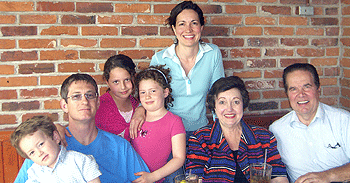Katherine Weilbaecher, M.D., says when she first came to Washington University, she referred to the School of Medicine as “Candyland” — and that says a lot about her. She’s the kind of person who can get as excited about science and medicine as the proverbial kid in a candy store.

“I was amazed when I started my lab here because whenever I wanted to do anything, there was so much expertise, knowledge and skill available that it seemed like Candyland,” says Weilbaecher, associate professor of medicine and of pathology and immunology.
The School of Medicine is indeed a sweet place for a woman who declared at 17 that she wanted to be a scientist. And while ordinarily you might expect a dispassionate temperament from someone with such scientific dedication, Weilbaecher exudes warmth, enthusiasm and youthful charm as she describes her research on how cancer spreads, or metastasizes, to bones.
“I’m an oncologist, but I also have a great interest in and love of bone biology,” she says. “That comes from research I did in medical school at Stanford University — I got totally into bone and blood. A lot of cancers metastasize to bone, and surprisingly, certain bone cells (osteoclasts) help them do it. I thought: ‘The cancers are hurting the bone and the bones are helping the cancers. How can we stop this relationship?'”
Weilbaecher has the tools to tackle the problem. She runs a lab that has six full-time members and spends time each week in the clinic treating women with breast cancer. Her clinical experience has quickly translated into trials looking at ways to block breast cancer from spreading to the bones — a favorite place for breast-cancer metastasis.
Weilbaecher has shown that a drug that blocks platelets from clumping together also blocks cancer from invading bone and other organs. She also has found that the osteoporosis-prevention drug, bisphosphonate, can inhibit bone metastasis and slow tumor growth in soft tissues.
Weilbaecher conducted those studies on mice, and her ongoing clinical trials will determine whether the findings hold true for breast-cancer patients.
“Kathy is one of our brightest, most successful and most accomplished faculty members in the Division of Oncology and the Siteman Cancer Center,” says John DiPersio, M.D., Ph.D., division chief. “In a short time, she has risen to the level of national and international notability.”
Weilbaecher comes from a long line of Weilbaecher physicians who practiced in her hometown of New Orleans. Her father also is an oncologist, and Weilbaecher was around a lot of cancer patients in her youth.
“Back then, doctors made house calls, and my father would take me along sometimes,” Weilbaecher says. “We’d be on our way to play tennis, and he’d say, ‘Let’s just stop by to see this patient.’ Or he’d call and say: ‘Come see this patient. I think she could use some cheering up.’ So for me, cancer wasn’t scary, it was just there.”
Naturally, Weilbaecher grew up wanting to be a doctor. But she also caught “the research bug,” as she calls it, when an internship between her junior and senior years of high school gave her a once-in-a-lifetime opportunity to work with Emmett Johnson, Ph.D., an expert in bacterial genetics, at the Pasteur Institute in Paris.
While attending Harvard University for her undergraduate degree in biology, Weilbaecher conducted research on DNA repair at Harvard Medical School. During medical school at Stanford University, she began the research that turned her on to bone biology. Then, she returned to Harvard for a fellowship in oncology, where she did a study of gene-regulating proteins that are active in bone cells.
At a meeting of bone biology scientists, Weilbaecher met Steven Teitelbaum, M.D., the Wilma and Roswell Messing Professor of Pathology and Immunology, and F. Patrick Ross, Ph.D., research professor of pathology and immunology, who encouraged her to look at Washington University.
Accustomed to coastal living, Weilbaecher and her husband, Michael Tomasson, M.D., assistant professor of medicine and genetics, were initially hesitant about St. Louis’ landlocked location. But they were drawn to both the high quality of the School of Medicine’s bone biology and leukemia programs and to the city itself. In 2000, she and Tomasson and their two daughters, Julia and Helen (Ellie) moved to St. Louis.
“We were surprised we could find a house so close to work — in Boston, we lived in a tiny apartment — and we like that everything here is only about 15 minutes away and that you don’t have to put your kids on the ballet list at conception,” Weilbaecher says.

Teitelbaum thinks Weilbaecher is one of those physician-scientists who has it all.
“Kathy Weilbaecher is going to be a major force in academic medicine,” he says. “She’s got terrific leadership skills and such good judgment. She’s highly respected, and students just flock to her.”
Weilbaecher credits Teitelbaum and Ross for their mentoring and support when she arrived at the medical school. And with characteristic generosity, she names others who have helped her get established.
“Senior scientists, like Stuart Kornfeld (M.D., the David C. and Betty Farrell Distinguished Professor of Medicine), suggested grants for me to apply for,” Weilbaecher says. “And John DiPersio is so helpful and encouraging — if you need something, he finds a way to get it.”
As Weilbaecher started her lab, she found colleagues, such as Carolyn Anderson, Ph.D., associate professor of radiology, who is collaborating with her on ways to visualize bone cells associated with tumors, and David Piwnica-Worms, M.D., Ph.D., professor of radiology and of molecular biology and pharmacology, who is working with her on methods for watching tumor movement.
Rebecca Aft, M.D., Ph.D., assistant professor of surgery, and Michael Naughton, M.D., assistant professor of medicine, who also treat breast cancer patients, helped Weilbaecher initiate her clinical trials.
“That’s what I love about Washington University — you’re not in it alone,” Weilbaecher says. “And my husband is so helpful. Michael reads my papers and grants, and we’ve collaborated on research — he’s co-author on one of my papers. Plus, he has a fabulous sense of humor. He keeps me laughing.”
Now a mother of three (her third child, Erik, was born shortly after she came to the University), Weilbaecher finds ways to balance scientific conferences, grant writing and patient exams with kids’ birthday parties and school plays.
|
Katherine Weilbaecher Family: husband Michael Tomasson, M.D., and children Julia (10), Helen (Ellie) (8) and Erik (4). “My mother is a medical illustrator and worked full time with four kids. She was a role model to me — she showed me that you can work and be a mom.” “I tell my younger women colleagues — and the guys, too — one of the great things about having kids is it forces you to have a life. If you let yourself, there is always more work you can do, but you have to stop. And then you go home and you get to have your mind on something totally different. The next morning, you are fresh again.” Hobbies: Tae kwon do (“I’m doing it with my kids, and we keep earning higher belts”), travel, reading, cooking (“I do it when I can, which isn’t often) and sudoku (“I’m almost a black belt in sudoku — it’s a time sink — don’t start it.”). |
“It takes a lot of communication,” she says. “Michael and I meet once a week for lunch to work out schedules — we practically need an Excel spreadsheet to keep track. I’m busy, but I wouldn’t have it any other way. I love my job, and the kids are my joy.”
Friend and colleague Paula Fracasso, M.D., Ph.D., associate professor of medicine, says Weilbaecher is a spectacular role model — for the women in her lab, for her daughters and for Fracasso’s own daughter.
“Kathy balances all the things she does in a beautiful way and keeps her cool,” Fracasso says. “She reminds you how much fun it is to be in the world.”
Weilbaecher describes herself as a person who sees the glass as half full, not half empty. Even being with cancer patients can be uplifting, she says.
“It’s the opposite of depressing,” she says of her time in the clinic. “I hope I’d have my patients’ bravery. It gives me a lot of confidence in the human spirit to be with them.”
She’s an optimist, but Weilbaecher says it’s the scientist in her that always insists there are solutions to just about every problem.
“I’m a big believer in using everything at my disposal,” she says. “You can always do something, another treatment — in my lab, I’m looking for ways to outsmart these cancers — or if not that, you can always find ways to make someone feel better, whether that’s using drugs or the power of the mind.”
Is Weilbaecher counting on making a big research breakthrough someday?
“We’re making progress,” she says. “But both Michael and I say maybe we’re just training the next Pasteur. I have great students and post-docs — the people I train, maybe they are going to be the ones.”